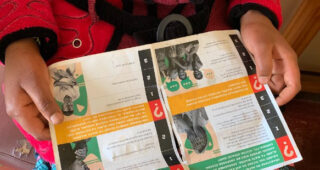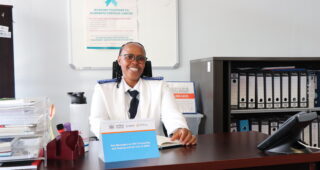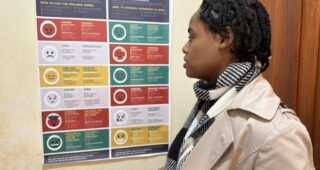Finding Love and Support in Zimbabwe
“Being HIV-positive doesn’t mean that you cannot find love,” says Tafadzwa Busuman. Tafadzwa has known about his HIV-positive status since he was a 12-year-old orphan living in Kwekwe, a mining town in central Zimbabwe. Today he is 25 and healthy—and engaged to be married.
Back in 2006, Tafadzwa was short for his age and sickly—as was his sister. Their aunt suspected that their parents had been HIV-positive and took the siblings to be tested for HIV. Brother and sister both tested positive. They were almost certainly infected with the virus during pregnancy or breastfeeding. At that time, HIV testing and treatment were not widely available in Zimbabwe.
Learning about his HIV-positive status was a double relief for Tafadzwa. After a childhood of illness and missed school, he was immediately enrolled on antiretroviral medication—which quickly ended his symptoms and got him back on track academically. In addition, Tafadzwa was connected to other children living with HIV through the Tinevimbo support group, sponsored by the Elizabeth Glaser Pediatric AIDS Foundation (EGPAF).
Tinevimbo means “We have hope” in the Shona language.
The Tinevimbo support group gives HIV-positive children and adolescents a safe space for discussing their related issues and concerns with peers, under the watchful eye of a caring health worker. A frequent topic in the group is how to address stigma and discrimination in the community. Stigma can erode the confidence in young people living with HIV and can discourage them from adhering to their medication. It can also hamper their quests for love.
“As we grow up it is something that is normal [to look for a love relationship], says Tafadzwa to a circle of his peers at a Tinevimbo meeting. “There was a time when I was worried, thinking that because of my HIV status I cannot make it in life—like never having a fiancé. But to my surprise, the opposite came true. I decided that I want a partner who is also a member of the Tinevimbo support group … and she’s right here … she’s right here.”

Patience Mushamiri, 21, blushes and stands at Tafadzwa’s urging. “Yes, I am his fiancé,” she says with a wide smile, “We fell in love through our support group.”
“I love his personality,” says Patience about Tafadzwa. “He is one person who understands me. He stands with me always—and I have seen it when I am sick. He is my best friend who I can tell my secrets to. He always encourages me to do what is best for me.”
“Here are some of the reasons that I love Patience,” says Tafadzwa: “She is focused. She comforts me in times of hardship. But what I love most about Patience is that she loves me.”
Like Tafadzwa, Patience once doubted that she could live a full life.
“I was one person who was never happy about my HIV-positive status from the moment that my parents disclosed it to me,” says Patience. “I felt unwelcome in the world. I felt lonely and cut friendships with those who didn’t know my status.
“I defaulted on my medication in 2005, and my auntie brought me [to Tinevimbo], where I was introduced to peers who comforted me and encouraged me on the importance of medication. These peers came to check on me, and they boosted me. I started to feel like I was in another world.
“The group helped me understand that I am not alone. I have friends here who care for each other and for me as well.” Patience Mushamiri
“The group helped me understand that I am not alone. I have friends here who care for each other and for me as well.”
“Tinevimbo gave light to my life and brought the hope that I can be someone in life, and I can achieve what I want, even if I am HIV-positive,” adds Tafadzwa.
Along with being members of the same support group, Patience and Tafadzwa are Community Adolescent Treatment Supporters (CATS). CATS are HIV peer counselors who have been trained through Africaid, a community-based partner of EGPAF.
“The main aim of the CATS is to try by all means to empower children living with HIV/AIDS and to follow up on treatment failure [for those HIV-positive children who are not taking their medication]” says Tafadzwa. “And we share ideas on how we can best live positively.”
Patience continues to volunteer as a CATS and hopes to go to college next year. Meanwhile, Tafadzwa is studying nursing and saving up money for Patience’s bride price (a sum that the groom makes to the family of the bride).
“I love kids a lot and will love to have my own,” says Patience. “I am so excited about my wedding.”
“Our wedding is a day that everyone will witness as one of our successes in life,” says Tafadzwa. “With the grace of God, everything is possible.”
Team EGPAF
Zimbabwe
Adolescent Identification, Care & Treatment; Pediatric HIV Diagnosis, Care & Treatment



